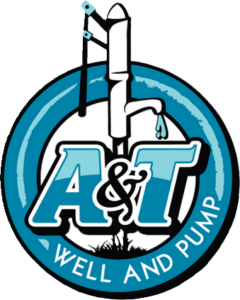When it comes to your home water supply, you have two choices: well repair or…

Abandoned wells may seem harmless, but when left untreated, they pose serious environmental and safety risks.
Whether a well is no longer producing water, has become contaminated, or is simply unused, proper well abandonment is a necessary process that ensures the well is safely sealed and removed from service.
Join our Raleigh well abandonment experts from A&T Well and Pump as we explore everything property owners need to know about proper well abandonment.
Table of Contents
What Is Well Abandonment?
Well abandonment is the process of permanently sealing a well that is no longer in use or has become unsafe, to prevent contamination and eliminate safety hazards.
This typically involves cleaning, disinfecting, and filling the well with approved materials like bentonite clay or concrete.
Whether it’s a residential, agricultural, or other type of well, proper abandonment protects groundwater, human health, and surrounding property from future risk.

When and Why a Well Needs to Be Abandoned
Not every well is meant to last forever. Over time, a water well may become obsolete, unsafe, or a liability—making abandonment not just a practical choice, but often a legal or environmental necessity.
Well Is No Longer in Use
When a well is no longer needed—whether due to a property sale, switch to municipal water, or changes in land use—it should be properly abandoned. Leaving an unused well open increases the risk of accidents and contamination.
Water Quality Is Unsafe
If a well becomes contaminated by bacteria, chemicals, or surface runoff and can no longer deliver safe drinking water, abandonment is often the safest option. Sealing the well prevents pollutants from spreading into groundwater supplies.
The Well Structure Is Damaged
Over time, well casings and linings can deteriorate or collapse, making the well unsafe and nonfunctional. Abandoning a structurally compromised well reduces hazards and ensures the site is safely contained.
New Water Source Has Replaced It
In cases where there is a new well installation or the property has transitioned to a different water source, the old well should be decommissioned. Maintaining only active, functional wells reduces maintenance costs and safety concerns.
Regulatory Requirements
Local or state regulations may require the abandonment of unused or non-compliant wells, especially before construction or land development projects. Proper well abandonment ensures legal compliance and prevents costly fines or delays.
The Risks of Not Abandoning a Well Properly
Failing to correctly abandon an unused or damaged well can lead to serious consequences for both property owners and the surrounding environment.
Groundwater Contamination
An open or improperly sealed well can act as a direct pathway for surface contaminants—such as pesticides, fertilizers, oil, or bacteria—to enter the groundwater. This threatens not only your own water supply but also nearby wells and ecosystems.
Safety Hazards
Unsealed wells pose physical dangers, especially on rural or undeveloped properties. Children, pets, or wildlife could fall into exposed or hidden wells, leading to injury or even death.
Structural Issues
Old or deteriorated wells can weaken the ground around them, potentially causing cave-ins or sinkholes. This can damage nearby structures, driveways, or farmland, creating the need for costly well repairs.
Legal Consequences
Most states have regulations requiring proper well abandonment. Property owners who ignore these rules could face penalties, fines, or be held liable for environmental damage caused by a neglected well.
The Well Abandonment Process
Well abandonment involves more than just filling a hole—it’s a detailed, regulated procedure that ensures safety, environmental protection, and legal compliance. Here are the key steps involved in the well abandonment process, typically performed by licensed professionals.
Initial Inspection
The first step is to assess the condition, depth, and construction of the well. A detailed inspection helps ensure the well is sealed in accordance with local and state regulations.
Obtaining Permits
Before any work begins, contractors may be required to secure permits from local or state environmental agencies. Regulations often dictate how wells must be sealed and documented, especially if contamination is suspected.
Preparing the Well
Any well pumps, pipes, or debris inside the well must be removed. The well is then cleaned and disinfected to prevent the spread of bacteria or chemicals during sealing.
Sealing and Backfilling
Once cleared, the well is sealed using approved materials like bentonite clay, cement, or grout to block water movement. The filling process starts at the bottom and proceeds upward to prevent air pockets. Different materials may be used depending on the well depth and local soil conditions. This step ensures that surface water and contaminants can’t enter the aquifer.
Final Inspection
After sealing, a final inspection is conducted to confirm the well is properly decommissioned. Contractors submit detailed records, including diagrams and sealing materials used, to the appropriate agencies. This documentation proves the well was abandoned according to the law.

Regulations and Local Guidelines in NC
In North Carolina, well abandonment must comply with regulations set by the NC Department of Environmental Quality (NCDEQ) to ensure safety and environmental protection.
Here is an overview of the legal requirements for well abandonment:
Sealing Requirements
Abandoned wells must be completely filled from bottom to surface using approved materials like bentonite or cement grout.
Certified Contractors Only
Only licensed well contractors in North Carolina are allowed to carry out abandonment work.
Permit Process
While a separate permit isn’t typically required, all procedures must follow NCDEQ standards.
Required Documentation
Contractors must complete and submit a Well Abandonment Record (Form GW-30) after the process is finished.
Report Details
The abandonment record must include information such as well depth, sealing methods, and materials used.
Owner Recordkeeping
Property owners should retain a copy of the abandonment form for future reference or property sale.
Local Oversight
County health departments may inspect the site and may have additional rules specific to their jurisdiction.
Pre-Project Contact
Always check with your local environmental health office before starting well abandonment work.
Benefits of Professional Well Abandonment
Hiring a licensed professional like A&T Well and Pump to abandon your well ensures the job is done safely, legally, and with long-term protection in mind.
Here are the key advantages of relying on our expert help:

Regulatory Compliance
Our licensed contractors are familiar with state and local requirements, helping you avoid fines, delays, or legal issues.
Environmental Protection
Our experienced professionals use the correct materials and techniques to prevent groundwater contamination and protect nearby water sources.
Proper Equipment and Expertise
Our certified well contractors have the tools and experience to clean, seal, and document the well correctly—especially if it’s deep, damaged, or obstructed.
Documentation and Reporting
Our experts handle all required forms and reports, ensuring everything is filed accurately with the proper authorities.
Increased Property Value
A properly abandoned well eliminates buyer concerns and can streamline property inspections or real estate transactions.
Long-Term Safety
Sealing the well properly prevents future accidents, structural damage, and liability for injuries or environmental harm.
Abandon Your Well Safely and Legally with A&T
If you have an unused or damaged well on your property, don’t leave it to chance.
As trusted experts in well installation, repair, and abandonment throughout the greater Raleigh area, we ensure your well is decommissioned properly, safely, and in full compliance with North Carolina regulations.
Contact our water well experts today by calling (919) 980-0981 or filling out our Contact Form to get started.

